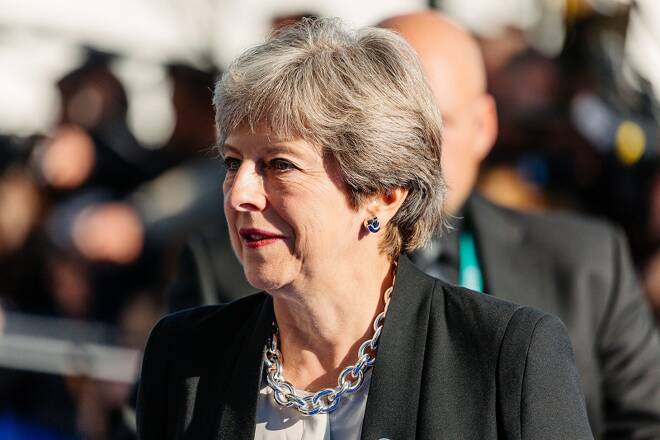Advertisement
Advertisement
Theresa May and the Gravity Defying Pound
By:
Theresa May is set to address Parliament on her recent progress. There could be a backlash to the latest vote delay. Time is running out...
Brexit
Brexit negotiations are supposedly on the final lap, as 29th March 2019 looms large. 2-years of negotiations are coming to an end and it remains to be seen whether Britain will do an about-turn in the face of adversity.
Theresa May has a busy day ahead. After updating her cabinet, she will be presenting progress on trade talks to Parliament.
As the number of defectors rise and more threaten to jump ship, Theresa May’s position at the helm of the Conservative Party may be safe. Her position as Prime Minister is an altogether different story, however.
The British PM may have bought herself some time on the Brexit front. Delaying Parliament’s meaningful vote until 12th March gives an extra 2-weeks of chat time with the unmalleable Establishment in Brussels. The real question is whether the additional 2-weeks will give the EU incentive to compromise on what it was unable to compromise on before.
Looking at the Pound this week, it’s been a gravity-defying act. At the time of writing, the Pound was up 0.31% to $1.31358. Considering the uncertainty that lies ahead, an almost 4-week high seems unpalatable.
No-Deal
Ironically, while the markets had fretted throughout the last 2-years over the prospects of a no-deal, British politics appear to have had an altogether differing outlook.
In contrast to a British Prime Minister, who is seemingly hell-bent on delivering Brexit at whatever cost, Parliament has put its foot down. Whether on the pro-remain or pro-Brexit side, no Brexit appears to be favored to no deal.
We’ve seen the creation of the Independent Party and more members of both sides of the camp will likely join between now and 12th March.
No deal has ultimately become a ray of hope for the Pound, the British economy and Britain in general. Parliament isn’t going to let such an event take place. That can only be a good thing for the Pound. After all, the lows over the last 2-years have come off the back of sheer panic that Britain would crash out of the EU.
Looking Ahead
As Theresa May addresses Parliament later today, the real focus will be on 12th March. If Theresa May fails to deliver an acceptable deal for Parliament to vote on, the 29th March departure date will likely be delayed. It remains to be seen until when Brexit is delayed. There have been suggestions for delaying by 2-years.
A delay would certainly be a positive for the Pound. In recent days, another development has been a shift in the Labour Party Camp. Labour Party leader Jeremy Corbyn has stated support for a 2nd referendum.
Newfound support for a 2nd Referendum suggests that Corbyn sees a way into Number 10 Downing Street.
Theresa May has managed to fend off previous votes of no confidence. This time around it may not go so well, assuming Parliament throw out May’s Brexit deal on 12th March. The British Prime Minister’s mandate was to lead Britain safely out of the EU. Theresa May also took over negotiations last year, due to the lack of progress prior. So it wouldn’t be unreasonable to think that a failure to deliver would lead to a snap general election.
After 2-years of wrangling, would Britain continue to vote to leave the EU? The Pound suggests not, though would the markets be as supportive for the Pound should Jeremy Corbyn take office?
Perhaps given the choice of a no-deal departure or Jemery Corbyn in office, the latter is the preferred option. For the Labour Party to oust the Tories, the 2nd Referendum would need to be on offer.
A 2nd Referendum would remove all doubts on whether Britain will leave or remain. A 2nd vote to leave would leave the Labour Party with the unenviable task of taking whatever they can get from the EU. That may ultimately be worse than what Theresa May has in her hands today…
It could be worse, however. Parliament could throw out the deal on 12th and vote against an extension to the 29th March departure date. Such an outcome could make the 2016 flash crash look more like a dip than a crash…
About the Author
Bob Masonauthor
With over 28 years of experience in the financial industry, Bob has worked with various global rating agencies and multinational banks. Currently he is covering currencies, commodities, alternative asset classes and global equities, focusing mostly on European and Asian markets.
Advertisement
